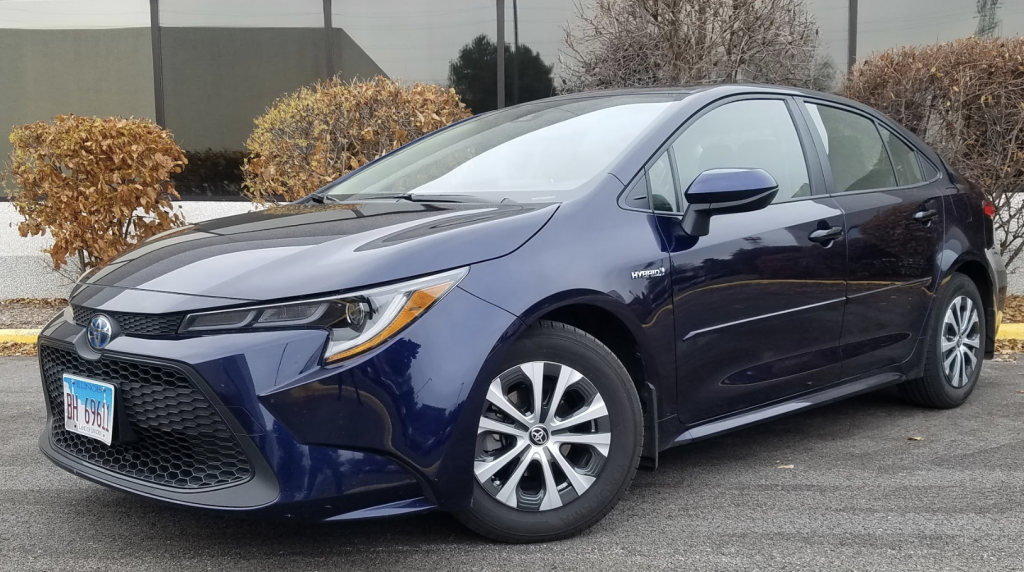
2020 Toyota Corolla Hybrid LE
Class: Compact Car
Miles driven: 569
Fuel used: 11.4 gallons
| CG Report Card | |
|---|---|
| Room and Comfort | B |
| Power and Performance | C+ |
| Fit and Finish | C+ |
| Fuel Economy | A+ |
| Value | A |
| Report-card grades are derived from a consensus of test-driver evaluations. All grades are versus other vehicles in the same class. Value grade is for specific trim level evaluated, and may not reflect Consumer Guide's impressions of the entire model lineup. | |
| Big & Tall Comfort | |
| Big Guy | B |
| Tall Guy | B |
| Big & Tall comfort ratings are for front seats only. "Big" rating based on male tester weighing approximately 350 pounds, "Tall" rating based on 6'6"-tall male tester. | |
| Drivetrain | |
| Engine Specs | 121-hp 1.8L |
| Engine Type | 4-cylinder hybrid |
| Transmission | CVT automatic |
| Drive Wheels | Front-wheel drive |
Real-world fuel economy: 49.9 mpg
Driving mix: 35% city, 65% highway
EPA-estimated fuel economy: 53/52/52 (city/highway/combined)
Fuel type: Regular gas
Base price: $22,950 (not including $930 destination charge)
Options on test vehicle: Body-side mouldings ($209), carpeted floor mats ($249), mudguards ($129)
Price as tested: $24,467
Quick Hits
The great: Fuel economy, smooth hybrid powertrain operation
The good: Ride quality, outward visibility, standard safety features
The not so good: Interior ambiance, missing some upscale features
More Corolla price and availability information
CG Says:
As we reviewed a very similar 2020 Toyota Corolla Hybrid last summer, we invite you to read that Test Drive report for more details. Here we’ll touch on some additional observations gleaned from a recent winter-weather test.
It’s long been known that cold weather adversely affects fuel economy. In both our summer and winter evaluations, about 35 percent of our test miles consisted of city driving, so this makes for a fairly accurate comparison. The biggest difference was that our winter test included four, full-throttle 0-60 runs, though that shouldn’t make much of a dent considering we covered nearly 570 miles in total.
During our summer test, we averaged a stellar 53.9 mpg; in winter, it dropped to a still-impressive 49.9 mpg – which is about what we’d expect due to the colder weather.
As the Corolla Hybrid carries a powertrain virtually identical to that of the famed Toyota Prius – a 1.8-liter 4-cylinder engine paired with two electric motor/generators fed by a nickel-metal-hydride battery for a combined 121 horsepower – those lofty figures aren’t really surprising … except that the Prius is a purpose-built hybrid with slick aerodynamics (not that the Corolla is a brick in this regard). Yet doing a direct fuel-economy comparison is a little tricky.
Not only do temperature and city/highway driving ratios come into play, but so does the Prius model being considered. The Prius now comes with four different powertrains: “regular,” Eco, Plug-in Prime, and – new for 2019 – AWD-e with all-wheel drive in place of front-wheel drive. With those cars, we’ve averaged, respectively, 52.6, 68.2, 88.7 (some miles driven on just electric power), and 51.1 mpg in our tests. As it’s the “regular” Prius that’s closest in powertrain configuration, the Corolla’s numbers are very close, and in fact, the EPA rates both the Prius and Corolla Hybrid at the same 52 mpg combined.
Where the Prius has an advantage is in its greater cargo room and versatility thanks to its hatchback body style. But where the Corolla has an edge is in price.
Yet it’s not a really big edge. Our test Corolla Hybrid LE listed for $24,880 including the $930 destination charge. By contrast, the least-expensive Prius starts at $25,280 – so just $400 more. But some folks may prefer the security of a trunk or maybe the Corolla’s sedan styling. Either way, it’s pretty much a toss-up.
Our Corolla Hybrid averaged about 9.88 seconds in the 0-60 sprint, a decent but hardly great showing. Yet it seemed quicker in normal driving, as it managed a good full-throttle jump off the line and exhibited fine response when the throttle was pressed at speed, making for satisfying around-town performance.
Although electric vehicles tend to get all the hype nowadays, and plug-in hybrids are a great stepping stone in that direction (with the ability to run on either electricity or gas), regular hybrids are really tough to beat from a value standpoint – especially when gas prices are low. Others hybrids in the compact class include the Honda Insight (also a sedan) and Hyundai Ioniq (a hatchback), the latter also offered in plug-in hybrid and pure electric form.
If it’s a fuel-sipping sedan you want, the Toyota Corolla Hybrid is a great choice. It has a lot of pluses with very few flaws, giving up little for the stellar fuel economy it delivers.
Check out our Compact Car Best Buys
Toyota Corolla Hybrid LE